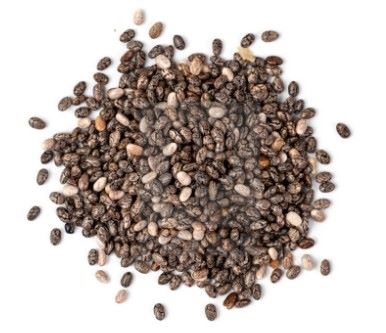

Symptoms of chia seed allergy may include skin irritation, itchy skin, reddening of the skin, hives, swelling, and coughing or wheezing. Other symptoms of an allergic reaction may include vomiting, diarrhea, increased salivating, and difficulty breathing.
The cause of chia seed allergy in dogs is an immune system reaction to the proteins found in chia seeds. This reaction causes the body to produce antibodies, resulting in the release of histamine and other inflammatory compounds that lead to the allergic symptoms associated with the allergy.
The diagnosis of a chia seed allergy in dogs typically begins with a physical examination and gathering of medical history from the owner. The veterinarian may look for signs of skin irritation, itching, redness, hives, swelling, coughing or wheezing, vomiting, diarrhea, increased salivation, and difficulty breathing. Blood tests or skin tests may be used to confirm the diagnosis. In some cases, an elimination diet, where the dog is fed one food at a time and any symptoms are monitored, may be used to determine whether the dog is allergic to the suspected cause.
Chia seed allergy is a serious and potentially life-threatening condition. If it remains untreated, it can lead to anaphylaxis, a severe systemic allergic reaction which can cause death. The mortality rate for anaphylaxis is around 10%, though this rate can vary somewhat between different populations and studies.
For dogs with a chia seed allergy, treatment should focus on reducing symptoms and preventing exposure to the allergen. Medications such as antihistamines and corticosteroids may help reduce inflammation and alleviate symptoms. Additionally, it’s important to avoid giving the dog food products containing chia seeds, and identify and remove any other sources of exposure in the home.
Prevention methods of chia seed allergy in dogs include taking steps to avoid contact with chia seeds, using hypoallergenic shampoos and grooming products, avoiding cross-contamination of chia seed products, and feeding your dog only high-quality, hypoallergenic foods. You should also consult with a Veterinarian to determine if any of your dog’s medications or supplements could be causing a reaction and, if so, what alternatives can be used. Additionally, if any signs of an allergic reaction present themselves, the dog should be taken to a Veterinarian immediately.
The chia seed allergy in dogs is not contagious and it cannot affect humans. However, it can affect other dogs if they come in contact with a dog that has the allergy. If a dog does have a chia seed allergy, owners should take steps to avoid exposing the dog to the allergen.
There are no known home remedies to manage a chia seed allergy. It is important to see an allergist to receive an accurate diagnosis and get guidance on how to best manage the allergies.
While there are no known home remedies for managing chia seed allergies, there are some natural remedies for managing other types of dog allergies. However, please keep in mind that these remedies are not a guaranteed solution and it is always best to consult with a veterinarian for the best possible care for your pup.
Several breeds of dogs are more vulnerable to chia seed allergy than others. Breeds such as Labrador Retrievers, Beagles, Boxers, Bulldogs, Poodles, Chihuahuas, and German Shepherds are all particularly prone to chia seed allergies. Symptoms can include chronic itching, skin rashes, hives, and respiratory distress. If your dog shows any signs of experiencing an allergic reaction to chia seeds, it is important to contact your veterinarian right away.
Has your dog ever experienced a chia seed allergy? If so, how did your pooch respond? What steps did you take to manage their symptoms? Understanding the process of managing a pet’s allergy episode can be overwhelming, so your efforts are admirable. At the end of the day, your highest priority is the health and well-being of your beloved dog. Wishing you and your pup the best!